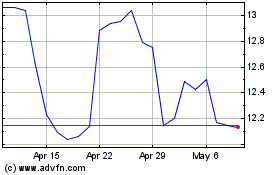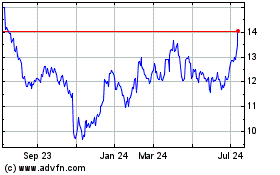By Trefor Moss
SHANGHAI-- Ford Motor Co. sales in China plunged 26% in the
first half of 2018 compared with the same period last year, and
there is little relief in sight as U.S.-China trade tensions
worsen.
China's auto market overall grew 5.6% in the first six months,
with sales reaching 14.1 million vehicles, according to figures
released Wednesday by the government-backed China Association of
Automobile Manufacturers.
But Ford sold just 400,443 of those--the company's poorest
first-half showing in China since 2012. By comparison, General
Motors Co. booked a record first-half performance in China, with
sales increasing 4% to 1.84 million.
Both U.S. auto makers face a potentially turbulent second half
of the year. The U.S. government Tuesday signaled its intention to
escalate its trade dispute with China by imposing tariffs on $200
billion in Chinese goods--on top of tariffs on $50 billion in goods
already planned or implemented.
While there are no signs yet of Chinese consumers turning
against American products, previous backlashes against Japanese and
Korean goods suggest Detroit might become a casualty of the
U.S.-China confrontation.
"There will definitely be some impact on the Chinese auto
market," should the U.S. impose its threatened tariffs, said Xu
Haidong, assistant secretary-general of the manufacturers
association.
The uncertain outlook means the manufacturers association is
sticking to its 2018 growth forecast of 3%, despite stronger than
expected growth in the first half, Mr. Xu said.
China's auto-parts industry could get dented by the next round
of tariffs, which include a threatened 10% levy on automotive
components. Mr. Xu, however, said he believes most U.S. customers
would simply pay the additional cost because "the best suppliers
are in China."
For Ford, trade tensions are escalating just as it seeks to
revive its fortunes in the world's largest auto market. Its Lincoln
premium brand was the only bright spot for Ford, with sales rising
4% in the January to June period.
But those Lincolns are exported from the U.S., and are now
subject to a 40% tariff imposed by China last week in retaliation
for new U.S. tariff measures.
Ford and GM build most of their cars for the Chinese market
through joint ventures with domestic partners, thus avoiding
tariffs. But Ford exported nearly 65,000 Lincolns to China last
year, along with nearly 19,000 Ford models including Explorer
sport-utility vehicles.
Ford has said it doesn't plan to raise prices for now,
sacrificing margins on imported Lincoln and Ford vehicles
instead.
"We always knew it would be a challenging year for us given our
position in the product cycle," Ford's Asia-Pacific President Peter
Fleet said.
Ford, which last year saw its China sales fall 6% from 2016
levels, is counting on new models to help it claw back territory.
But they won't hit showrooms until next year, and sales have yet to
bottom out. Ford's June sales were down 38% year-over-year, the
biggest monthly decline so far.
While General Motors doesn't export a significant number of cars
to China, its fortunes are much more closely linked to Chinese
sales. GM sold 9.6 million vehicles world-wide last year, 4 million
of them in China, whereas Ford sold 6.6 million cars globally and
1.2 million in China.
GM didn't respond to questions about the implications of the
U.S.-China dispute.
The company was one of several foreign auto makers that tapped
market growth in the first six months of 2018. Nissan Motor Co.
sold 720,447 vehicles in China in the first half, up 11%
year-over-year, while Toyota Motor Corp. saw its sales rise 9% to
about 680,000 vehicles.
After a red-hot 2017, Honda Motor Co.'s sales in China fell 6%
to 609,100 vehicles in the first half.
Overall, sales of passenger cars rose 4.6% to 11.8 million in
the January to June period, the manufacturers association said,
while commercial vehicle sales were up 10.6% to 2.3 million.
Electric-vehicle sales continued to grow strongly, boosted by
government subsidies and other policies encouraging consumers to
buy EVs. They increased 112% to 412,000 in the first half of the
year, on course to top 1 million annual sales for the first
time.
In May, the southern province of Hainan became the ninth region
in China to start restricting sales of gasoline cars. Motorists
there must now enter a lottery to obtain a license plate for a
traditional vehicle, whereas license plates for EVs are available
automatically.
Geely Auto--the domestic brand of Zhejiang Geely Holding Group
Co., which is the owner of Volvo Car Group and the largest
shareholder in Daimler AG--cemented its status as China's
best-selling domestic car brand. Its sales increased 44% in the
first half to 766,630 vehicles.
Lin Zhu in Beijing contributed to this article.
Write to Trefor Moss at Trefor.Moss@wsj.com
(END) Dow Jones Newswires
July 11, 2018 06:38 ET (10:38 GMT)
Copyright (c) 2018 Dow Jones & Company, Inc.
Ford Motor (NYSE:F)
Historical Stock Chart
From Aug 2024 to Sep 2024

Ford Motor (NYSE:F)
Historical Stock Chart
From Sep 2023 to Sep 2024
